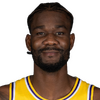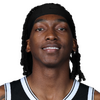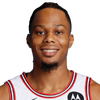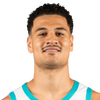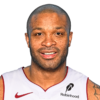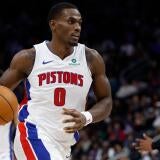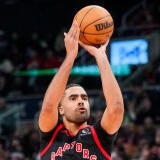NBA stretch run X-factors: Five players that could swing the championship picture
These five players are going to be key to their teams' title hopes
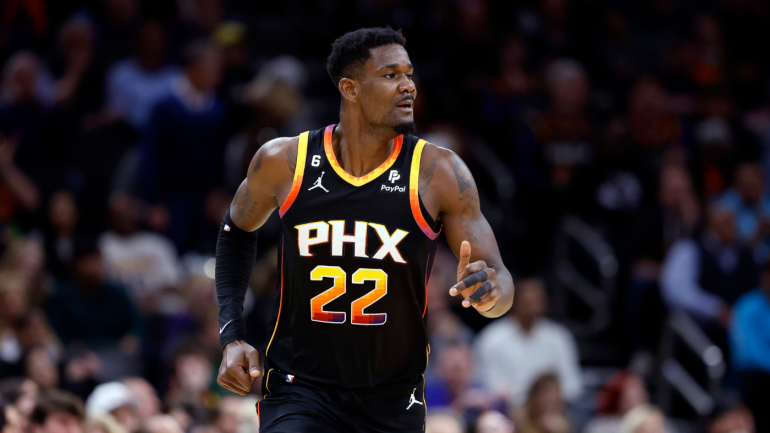
The 2022 NBA Finals swung, in part, on Kevon Looney's timely offensive rebounding. The 2021 NBA Finals were decided largely during the miserable minutes in which the Phoenix Suns were forced to use one of their backup centers. The 2020 Lakers don't win the championship without Markieff Morris and Rajon Rondo turning into 3-point marksmen. The 2019 Toronto Raptors would have lost the Eastern Conference finals to the Milwaukee Bucks were it not for Fred VanVleet shooting a preposterous 14-of-17 from deep in the last three games of that series.
It's commonly said that the NBA is a star's league, and that is largely true. Teams don't reach the final rounds of the postseason without stars, but once you've reached the inner circle, championships often boil down to that one key role player excelling in some unexpected way. For every Stephen Curry shooting his team to a championship, there's a Kevon Looney grabbing his misses and giving him another chance.
Those players are more relevant than ever in the all-in NBA. The price of acquiring stars has gotten so obscenely high that most of the teams that currently have them needed to sacrifice most of their depth to get them. Golden State and Milwaukee have largely managed to maintain the supporting casts that helped them win their championships, but many of this season's favorites weren't so lucky. A few of our contenders are now incredibly reliant on a small group of role players to serve as their Looney or VanVleet this spring.
So who are those players? Here are five of the biggest X-Factors of the 2022 championship push.
William Faulkner believed that "the only thing worth writing about is the human heart in conflict with itself." Whether the conflict is in his heart or his head, there's a pretty clear conflict taking place in Phoenix between the player Deandre Ayton wants to be and the one that he should be trying to be.
When the Suns reached the NBA Finals in 2021, 53 percent of Ayton's field goal attempts were within three feet of the rim. That figure is down to 33.7 percent this season, with the difference coming through a variety of hooks, floaters and jumpers that Phoenix can no longer tolerate. He's averaging a career-high in free throw attempts per game at 3.1... which is fewer than teammate Chris Paul, who is a foot shorter than him, more than a decade older and takes nearly three fewer shots per game. Ayton is among the most physically gifted seven-footers in basketball. There's no good reason for him to play offense like a tall shooting guard.
The Suns largely tolerated these interior misadventures out of necessity. Ayton wanted to leave over the summer. Phoenix was unwilling to surrender such a talented player for nothing. The Suns matched the max offer sheet Indiana gave Ayton resolving to figure out his future later. Well, later has arrived, and it brought Kevin Durant with it.
Phoenix already had an ugly shot profile. Ranking No. 3 in mid-range attempts and 27th in the restricted area creates a mathematical disadvantage that's hardly unsolvable (especially with Durant involved), but leaves little room for freelancing. Durant gets to shoot mid-range jumpers. Paul gets to shoot mid-range jumpers. Devin Booker gets to shoot mid-range jumpers. They get to do that because they're better at it than almost anyone in NBA history. Ayton isn't.
He doesn't need to be. What he does need to be is a switch-buster, because as long as Ayton avoids contact and settles for any shot that isn't a layup or a dunk, opposing defenses are going to switch every ball screen Monty Williams designs to free up his perimeter scorers. The Suns scored 1.415 points per possession when finishing plays with Ayton as the roll man in 2021. This season? They're down to 1.225. That's fine. It's not the elite figure Ayton reached at his peak.
There's no excuse anymore. Ayton got his max contract. He's playing for a championship favorite. His job is to feast on all of the dunks, layups and free throws his smaller teammates create for him. We've already seen the template for this back in 2021. Now the responsibility lies with Ayton to recreate it in 2023.
There was a time in the not too distant past in which Russell Westbrook actually made a shred of sense for the Clippers. For most of the first three months of the season, they generated no rim pressure and rarely played with pace. They were scoring only 42.2 points in the paint per game before inserting Terance Mann into the starting lineup. That figure has jumped all the way up to 46.8 with Mann as a starter. That's still below average, but there's a pretty massive difference difference "bad" and "worst in the league" where the Clippers are concerned. They have so much shooting and individual creation that even a bit of rim pressure changes the entire geometry of the floor.
Since inserting Mann into the starting lineup permanently on Jan. 6, the Clippers are scoring 119.1 points per 100 possessions. That's better than any offense in the NBA over the full season, and units featuring Mann, Paul George and Kawhi Leonard are posting championship-caliber offensive numbers. Since Jan. 6, lineups featuring that trio are...
- Scoring 128.4 points per 100 possessions.
- Outscoring their opponents by 7.8 points per 100 possessions
- Shooting 52.4 percent from the field and 42.6 percent on 3-pointers.
The five-man starting lineup of Mann, Leonard, George, Marcus Morris and Ivica Zubac is outscoring opponents by 14.8 points per 100 possessions. More importantly, the Clippers are 7-3 when starting those five players. It's a perfect mix, one that is emblematic of what makes the Clippers special. This team isn't a Ferrari. It's a Bentley. They're meant to play slow, methodical basketball with just enough pace and rim pressure to create advantages for their shooters. It's what made the addition of Westbrook so bizarre. The Clippers are trying to strap a jet engine to their luxury sedan.
Westbrook offers the pace, passing and pressure that the Clippers once needed. He just doesn't provide much of anything else. He's one of the worst high-volume shooters in NBA history. He's among the NBA's most turnover-prone players, and that doesn't even include the increasingly frequent missed layups that turn into fast breaks for the other team. Westbrook might be able to bend the geometry of the court when he has the ball. When he doesn't? Opposing teams are just going to slap their center on him and defend the Clippers five-on-four. The Lakers had two years to address that weakness and came up with no better answer than "just take him off of the floor."
The Clippers might come to that realization too. They're going to need to if they plan to play the five-out style that has made them so dangerous during their rare peaks during the Leonard-George era. Leonard and George themselves reportedly advocated for Westbrook. Mann is the better player. He offers most of what Westbrook does without the drawbacks, and unlike Westbrook, he has a track record with this team's best players.
You don't sign Westbrook without making substantial promises about his role and minutes. Leonard and George didn't push for Westbrook only to watch the Clippers plaster him to the bench. Right now, the bulk of this team's point guard minutes are his to lose. Mann is going to have to outplay him by a wide margin over these next two months if he plans to keep the job he's earned. For the Clippers' sake, let's hope he does so.
There are so many fake 40 percent 3-point shooters for us to pick from this season. If Torrey Craig keeps shooting 40 percent, the Suns are probably going to win the championship. Yuta Watanabe was the NBA's leader in 3-point percentage for a stretch early in the season. These are the sort of players that we should probably be comparing to Isaac Okoro, who is now shooting 43.6 percent from deep over a 30-game sample. The problem? He's taking only 2.6 3s per game in that span.
This is where our doubts in the Craigs and Watanabes of the world creep in. These outlier shooting seasons might be indicative of genuine improvement, but they might not be, and when the playoffs arrive, opponents are going to start firmly in the "they aren't" camp. Teams would rather let Torrey Craig shoot than surrender help that could be used against Devin Booker and Kevin Durant. That's how defenses treat Okoro. He's taken 78 total 3-pointers during this impressive stretch, but according to NBA.com, 70 of them have been wide-open. For reference, Donovan Mitchell has taken 222 3-pointers in that window. Only 46 were wide open.
Cleveland can live with that for most of the game. Their half-court offense ranks ninth in the NBA, according to Cleaning the Glass. The problems arise in clutch situations. The Cavaliers have mostly leaned on Caris LeVert as their fifth player in those moments, and it hasn't worked. Their clutch offense dips to No. 21 in the NBA, and their defense, ranked No. 1 in the NBA for the season, falls to 16th in those big moments. It's not hard to see why. When the game devolves into a one-on-one slugfest, having three small guards on the floor does more harm than good. Evan Mobley can handle most big forwards, but what's Cleveland's solution for scoring guards? Better yet, how will they handle teams with multiple star creators? Mobley can hold his own against Jayson Tatum, but there's no answer for Jaylen Brown here besides Okoro.
That's what makes Okoro the most important outlier shooter in basketball right now. There is going to come a moment (or several) in the playoffs in which the Cavaliers have no choice but to leave him on the floor late to cover somebody's best scorer. When that moment comes, he's either going to make his wide-open 3's, or the Cavs are going to lose.
Welcome to the deep end, Josh Green! After playing mostly garbage time in the past two postseasons, Green is not only the new starting shooting guard for the Dallas Mavericks, but may be their most important defender in a conference with Stephen Curry, Devin Booker, Jamal Murray, Ja Morant, De'Aaron Fox and Anthony Edwards. Dallas isn't making it through the postseason without running into an All-Star guard. It might have to face three of them in a row.
This is where Dorian Finney-Smith's former understudy comes in. The metrics adore Green. FiveThirtyEight's RAPTOR ranks him as the 16th-best defender in the NBA to have played at least 1,000 minutes this season, putting him in a tie with former Defensive Player of the Year Giannis Antetokounmpo. According to Dunks&Threes' EPM metric, Green is already Finney-Smith's defensive equal.
Jason Kidd remains unconvinced. He's largely split top assignments with Reggie Bullock lately, and neither has had much success. Fox just torched the Mavericks for 69 points on nearly 60 percent shooting across back-to-back matchups. Anthony Edwards was nearly as good in a 32-point showing against Dallas.
Dallas ranked 24th in defense even before dealing Finney-Smith in the Kyrie Irving blockbuster. Getting Maxi Kleber back will help, and he'll take the more difficult forward matchups that the West can offer such as LeBron James, Kevin Durant and Kawhi Leonard. But the West is a conference that, for the past several years, has been dominated largely by guards. As dominant as the Irving-Luka Doncic duo can be offensively, it won't matter much if the opponent is just making everything up on the other end of the floor. Finney-Smith has been their answer over the past few seasons. Now, that job falls to Green.
If you exclude the 2020 bubble, in which Ben Simmons was injured, the 76ers have played 1,354 postseason minutes with Joel Embiid on the floor. They've won those minutes by 335 points, so roughly one point for every four minutes that Embiid plays. Yet they've never reached the conference finals with him. Why? Because they've been outscored by 168 points in the 864 postseason minutes they've played without him in that span. The 76ers play like champions with Embiid in the postseason and like a lottery team without him.
The 76ers have been so desperate to correct this problem over the past several years that in 2019, they gave Al Horford a $100 million contract hoping that he could provide them sorely-needed Embiid insurance. He didn't. Neither did Greg Monroe or DeAndre Jordan. Montrezl Harrell played a huge role in knocking Doc Rivers out of the 2020 postseason. Considering how little Daryl Morey did to solve the backup center problem at the trade deadline, he might cost him again in 2023.
Of course, it's possible that Morey believed the answer was already on his roster. P.J. Tucker has played plenty of center since joining Morey's Rockets in 2018. In a tiny sample this season, the results have been mixed. When Tucker plays with Philadelphia's four other core players (James Harden, Tyrese Maxey, De'Anthony Melton and Tobias Harris), the 76ers are bludgeoning opponents by 15 points per 100 possessions. All other Tucker at center lineups are getting destroyed.
Those examples might be extreme, but they set a template for what Tucker-at-center lineups need to be. Not only is Tucker never going to create shots for himself or teammates, but he deprives Harden and Maxey of traditional pick-and-roll partners. Philly has successfully compensated by playing the two of them together with Tucker, but that's a much tougher sell in the postseason, when they likely need to be staggered so that one is on the floor at all times.
That's going to create offensive issues. Defensively, it's not clear if the 76ers have the personnel to switch anymore, especially now that Matisse Thybulle is gone. Is Rivers even going to feel comfortable going small? He didn't last season, when his stubborn refusal to move away from Jordan played an important role in Philadelphia's second-round loss to Miami.
But if Morey didn't think Rivers would use Tucker at center, he probably would've sought an upgrade... right? In all likelihood, there is a plan in place here. We just don't know what it is yet. Morey is the general manager who once eschewed the center position entirely in Houston by relying solely on Tucker and Robert Covington. It would only be fitting, then, that he'd solve Philadelphia's long-time backup center woes by once again relying on a non-center in Tucker.


